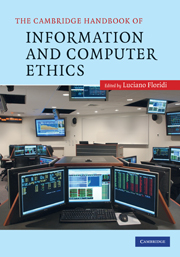Crossref Citations
This Book has been
cited by the following publications. This list is generated based on data provided by Crossref.
2010.
Books Received.
Philosophy,
Vol. 85,
Issue. 4,
p.
585.
Stahl, Bernd
Elizondo, David
Carroll-Mayer, Moira
Zheng, Yingqin
and
Wakunuma, Kutoma
2010.
Ethical and legal issues of the use of computational intelligence techniques in computer security and computer forensics.
p.
1.
Stahl, Bernd Carsten
Heersmink, Richard
Goujon, Philippe
Flick, Catherine
van den Hoven, Jeroen
Wakunuma, Kutoma
Ikonen, Veikko
and
Rader, Michael
2010.
Identifying the Ethics of Emerging Information and Communication Technologies.
International Journal of Technoethics,
Vol. 1,
Issue. 4,
p.
20.
White, Jeffrey Benjamin
2011.
Infosphere to Ethosphere.
International Journal of Technoethics,
Vol. 2,
Issue. 4,
p.
53.
Floridi, Luciano
2011.
Energy, Risks, and Metatechnology.
Philosophy & Technology,
Vol. 24,
Issue. 2,
p.
89.
Pagallo, Ugo
2011.
Designing Data Protection Safeguards Ethically.
Information,
Vol. 2,
Issue. 2,
p.
247.
Dodig Crnkovic, Gordana
and
Hofkirchner, Wolfgang
2011.
Floridi’s “Open Problems in Philosophy of Information”, Ten Years Later.
Information,
Vol. 2,
Issue. 2,
p.
327.
Brown, Bernard
2012.
Student Reactions to Learning with Technologies.
p.
117.
Stahl, Bernd Carsten
Heersmink, Richard
Goujon, Philippe
Flick, Catherine
van den Hoven, Jeroen
Wakunuma, Kutoma
Ikonen, Veikko
and
Rader, Michael
2012.
Ethical Impact of Technological Advancements and Applications in Society.
p.
61.
Floridi, Luciano
2012.
Turing's three philosophical lessons and the philosophy of information.
Philosophical Transactions of the Royal Society A: Mathematical, Physical and Engineering Sciences,
Vol. 370,
Issue. 1971,
p.
3536.
Stahl, Bernd
Carroll-Mayer, Moira
Elizondo, David
Wakunuma, Kutoma
and
Zheng, Yingqin
2012.
Computational Intelligence for Privacy and Security.
Vol. 394,
Issue. ,
p.
237.
Létourneau, Alain
2012.
Internet comme ressource commune : des questions pour une éthique des ordinateurs et technologies de l’information.
Éthique publique,
Cohen-Almagor, Raphael
2012.
Luciano Floridi’s Philosophy of Technology.
Vol. 8,
Issue. ,
p.
151.
Pasquinelli, Elena
2012.
Luciano Floridi’s Philosophy of Technology.
Vol. 8,
Issue. ,
p.
125.
Stahl, Bernd Carsten
Eden, Grace
and
Jirotka, Marina
2013.
Responsible Innovation.
p.
199.
Banchs, Rafael E.
and
Penagos, Carlos G. Rodríguez
2013.
Emerging Applications of Natural Language Processing.
p.
230.
Durante, Massimo
2013.
How to cross boundaries in the information society.
ACM SIGCAS Computers and Society,
Vol. 43,
Issue. 1,
p.
9.
White, Jeffrey Benjamin
2013.
Moral, Ethical, and Social Dilemmas in the Age of Technology.
p.
215.
Banchs, Rafael E.
and
Penagos, Carlos G. Rodríguez
2013.
Small and Medium Enterprises.
p.
1945.
Skowron, Andrzej
Chakraborty, Mihir Kr.
Grzymała-Busse, Jerzy
Marek, Victor
Pal, Sankar K.
Peters, James F.
Rozenberg, Grzegorz
Ślȩzak, Dominik
Słowiński, Roman
Tsumoto, Shusaku
Wakulicz-Deja, Alicja
Wang, Guoyin
and
Ziarko, Wojciech
2013.
Rough Sets and Intelligent Systems - Professor Zdzisław Pawlak in Memoriam.
Vol. 42,
Issue. ,
p.
1.



